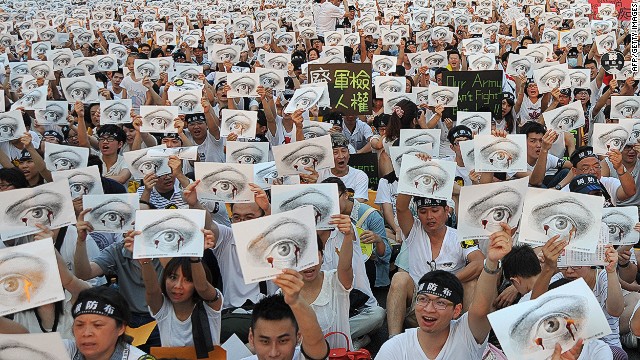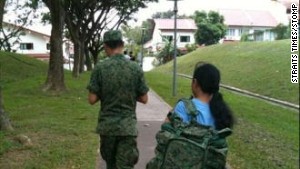|
Taiwan protests throw
spotlight on Asia's military service
By Peter Shadbolt, CNN
August 8, 2013 -- Updated 0300 GMT (1100 HKT)
http://edition.cnn.com/2013/08/07/world/asia/taiwan-military/index.html

Protesters hold placards during
an anti-military rally in front of Taiwan's presidential office in Taipei.
(CNN) -- It could have been a scene lifted
straight from the classic Sean Connery film "The Hill" -- a drama in which a
military prison erupts into riot after an inmate dies following a repetitive
drill on an artificial hill in the blazing desert sun.
But in Taiwan's real life version of the film, 18 army officers have been
charged, a defense minister has resigned and the parents of 24-year-old Hung
Chung-chiu are still demanding justice after their son died following an arduous
punishment drill in Taiwan's searing summer heat.
Corporal Hung was just three days short of completing his military service last
month when he was reportedly put in solitary confinement for bringing a mobile
phone with a camera onto his military base, normally a minor military
transgression.
Later subjected to a series of tough punishment exercises, doctors say he died
of organ failure brought on by severe heatstroke.
Since then, Taipei has erupted in protest.
More than 100,000 placard-waving people protested outside the Presidential
Palace on the weekend, according to organizers Citizen 1985, and another large
protest is scheduled for this weekend.
The protest underscores the increasing unpopularity of military service, not
just in Taiwan, but in Asia's other developed economies such as South Korea and
Singapore where young people see compulsory military service as an unwelcome
interruption to university and a career.
Singapore, with a conscription period of 24 months and a further six months of
reservist obligations, has one of the longest periods of national service behind
South Korea and Israel.
"Conscription takes away two years of a citizen's freedom in the name of
'national interests'," said former conscript Gordon Lee in a Singapore political
blog. "Unfortunately, in the case of Singapore, where tensions are cool, these
'national' or 'security' interests do not outweigh two years of the lives of
every male citizen."
"Even though the government often compares Singapore to Israel, South Korea and
Taiwan as being a small and vulnerable state, the fact is, they live in
situations of greater tension (than we do in Singapore)."
The Singapore government promotes military service as a cheaper way of building
a standing army and as a means of bonding recruits regardless of their
backgrounds.
"If anything, Singaporeans are just further trained to blindly obey instructions
from their superiors," Lee said in the post. "This culture is detrimental to
society as a whole, and seems to affect creativity in the society, which is
important for the spirit of free enterprise. Surely two years of a person's life
is more important than this 'bonding' that presumably takes place?"

This picture of a maid carrying a SIngapore national serviceman's
backpack went viral in 2011
The Singapore government has been criticized for responding to worried parents
by making military service safer and softer for recruits -- in one case a
conscript was famously snapped making his maid carry his military pack.
For many, these responses are part of the civilianization of military life,
throwing a question mark over the effectiveness of a popular -- rather than a
professional -- army.
"I would say (these developments) are partly in response to worried parents, but
they are probably due in large to a natural evolution of the society in which
these institutions are found," Lee told CNN. "For example, there has also been a
larger appetite for health and safety measures in, say, the construction sector
as well."
Efforts in South Korea to make military service more palatable and popular by
making a special unit of celebrity K-Pop recruits was scrapped last month after
it was found that too often celebrity lifestyles were inimical to the harsh
realities of military life.
Top brass and regular recruits took a dim view of unauthorized dates, drunken
trips to massage parlors and other preferential treatment for the celebrity
grunts in a country where military service is regarded as a solemn national
duty.
"Although we initially formed the unit to promote the military, a number of
unfortunate incidents damaged the public image of the military and lowered the
morale of all the regular soldiers who are in the service," the ministry's vice
spokesperson Wi Yong-seob said at a press conference.
First formed 16 years ago, the celebrity unit acted as the military's public
relations office by holding concerts for soldiers or performing at important
anniversaries. The issue of celebrities enlisting in the military has long been
controversial in South Korea where some argue that K-Pop stars should be exempt
from military service because of the substantial foreign revenue they bring to
the country.
Psy -- the "Gangnam Style" star -- is perhaps one of the most high-profile
military discipline cases, famously repeating his two-year service in 2007 after
neglecting his duties by giving private concerts and TV show appearances.
In Taiwan, meanwhile, Hung's death has dealt a severe blow to the public profile
of the country's military.
Already, the Ministry of National Defense is falling drastically short in its
bid to attract volunteers: its target for 2013 is 17,447 people, but as of July
3 only 1,847 had signed up.
Beijing still claims Taiwan -- which split with China in 1949 following the
civil war -- as part of its sovereign territory and says it will take the island
by force if necessary.
A 2011 report by Taiwan's Ministry of National Defense states the Chinese
People's Liberation Army has 10 times as many troops as Taiwan and a military
spend of roughly US$78 billion, compared with Taiwan's US$9 billion.
"Yet, the People's Republic of China's actual military funding is somewhere
between two to three times the figure it has disclosed. Therefore, the actual
difference in defense budget on the both sides may reach up to 21-fold," the
report stated.
The Hung incident is being taken seriously by Taiwan's military whose plans to
raise an all-volunteer force by the end of 2014 may be receding in the current
hostile climate.
"There will certainly be an impact," Col. Hu Zhong-shi, director of the
ministry's Recruitment Center of National Armed Forces, told a news conference.
"We are continuing to observe the extent of what that impact might be."
|
![]()
![]()
![]()